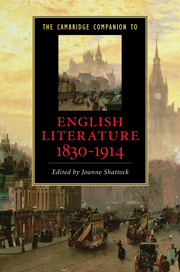Book contents
- Frontmatter
- Introduction
- Part 1 Modes of writing and their contexts
- 1 Authors and authorship
- 2 Readers and readerships
- 3 Life writing
- 4 The culture of criticism
- 5 Women’s voices and public debate
- 6 Writing the past
- 7 Radical writing
- 8 Popular culture
- Part II Intersections and incursions
- Part III The centre and the periphery
- Guide to further reading
- Index
6 - Writing the past
from Part 1 - Modes of writing and their contexts
Published online by Cambridge University Press: 28 November 2010
- Frontmatter
- Introduction
- Part 1 Modes of writing and their contexts
- 1 Authors and authorship
- 2 Readers and readerships
- 3 Life writing
- 4 The culture of criticism
- 5 Women’s voices and public debate
- 6 Writing the past
- 7 Radical writing
- 8 Popular culture
- Part II Intersections and incursions
- Part III The centre and the periphery
- Guide to further reading
- Index
Summary
The past as we know it was largely created by the Victorians. Historical terms and concepts such as the Renaissance, the Augustan, Modernity, the Zeitgeist - indeed, the very coinage 'Victorian', and even the idea of periodicity itself, were nineteenth-century inventions. Moreover, we have inherited from the nineteenth century a modern historical consciousness, and historiographical methods, for it was during this period that the modern discipline was defined and professionalized, that the counterclaims of empiricists and idealists were first articulated. This was when the German empiricist Leopold von Ranke introduced the methods of 'objective' history, the French republican Jules Michelet those of 'total' history, and the Swiss historian of art and culture Jakob Burckhardt those of Kulturgeschichte, and when Hegel and Marx shifted the focus of historical study away from the rise and fall of rulers and nations to the analysis of social change, together revolutionizing the historical sciences across Europe; while, in Britain, Carlyle and Macaulay presided over an efflorescence of narrative history and in 1886 the professional journal the English Historical Review was founded.
Nineteenth-century historiography is sometimes represented as somewhat monolithic, comprising predominantly grand narratives of great men, and celebrating nationalist and imperialist ideologies within either the progressivist paradigm of Whig history or the cyclic model of history favoured by conservatives. However, it is on the contrary precisely because history writing in an age described by Nietzsche in On the Use and Abuse of History for Life (1873) as suffering from a consumptive ‘historical disease’ was so rich and various, and took so many literary forms beyond that of the formal academic treatise, that modern cultural historians, critics and theorists so often turn to it, as a source or model, or as offering exemplification and elaboration of modern methods.
- Type
- Chapter
- Information
- The Cambridge Companion to English Literature, 1830–1914 , pp. 108 - 126Publisher: Cambridge University PressPrint publication year: 2010
- 3
- Cited by

